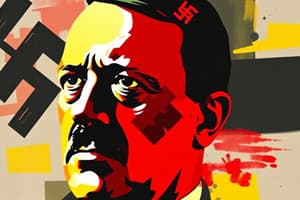Podcast
Questions and Answers
What was the main reason for the rise of the Nazi Party in Germany?
What was the main reason for the rise of the Nazi Party in Germany?
- Germany's economic crisis and political instability (correct)
- The rise of communism in Eastern Europe
- The Treaty of Versailles' harsh penalties on Germany
- The death of many German soldiers in World War I
Who became Chancellor of Germany in 1933 and then declared himself Führer in 1934?
Who became Chancellor of Germany in 1933 and then declared himself Führer in 1934?
- Joseph Goebbels
- Hermann Göring
- Rudolf Hess
- Adolf Hitler (correct)
What is the core idea behind the Nazi ideology of 'Lebensraum'?
What is the core idea behind the Nazi ideology of 'Lebensraum'?
- Promotion of individual freedoms and opposition
- Persecution of Jews and other minorities
- Establishment of a communist state
- Need for expansion and colonization of Eastern Europe (correct)
What was the purpose of the Reichstag Fire Decree?
What was the purpose of the Reichstag Fire Decree?
What were the Nuremberg Laws enacted in 1935?
What were the Nuremberg Laws enacted in 1935?
What was Kristallnacht?
What was Kristallnacht?
What was the outcome of the Munich Agreement?
What was the outcome of the Munich Agreement?
What was the result of the Allied Victory in May 1945?
What was the result of the Allied Victory in May 1945?
Flashcards are hidden until you start studying
Study Notes
Nazism and Hitler
Rise of Nazism
- After World War I, Germany experienced economic crisis, hyperinflation, and political instability
- Nazi Party, led by Adolf Hitler, capitalized on these conditions to gain popularity
- Nazi ideology: nationalism, racism, anti-communism, and anti-Semitism
Adolf Hitler
- Born in 1889 in Braunau am Inn, Austria-Hungary
- Served in German Army during World War I, wounded twice and gassed once
- Became involved in politics after the war, joined German Workers' Party (DAP)
- Renamed party to National Socialist German Workers' Party (NSDAP) or Nazi Party
- Hitler became Chancellor of Germany in 1933, then declared himself Führer in 1934
Nazi Ideology
- Racial purity: belief in the superiority of the "Aryan" race
- Lebensraum: need for expansion and colonization of Eastern Europe
- Anti-Semitism: persecution of Jews, blamed for Germany's problems
- Authoritarianism: suppression of individual freedoms and opposition
Nazi Regime (1933-1945)
- Gleichschaltung: consolidation of power, elimination of opposition parties and trade unions
- Reichstag Fire Decree: suspended civil liberties, allowed for arrests and censorship
- Nuremberg Laws: stripped Jews of citizenship, prohibited intermarriage with non-Jews
- Kristallnacht: wave of violent attacks against Jews, November 1938
World War II
- Anschluss: annexation of Austria, March 1938
- Munich Agreement: appeasement policy, allowed Germany to annex Czechoslovakia
- Invasion of Poland: September 1939, prompted declarations of war by France and UK
- Holocaust: systematic murder of six million Jews and millions of others deemed undesirable
Downfall of Nazism
- Allied Victory: Soviet Union captured Berlin, Hitler committed suicide, May 1945
- Nuremberg Trials: prosecution of Nazi leaders for war crimes and crimes against humanity, 1945-1946
Rise of Nazism
- Post-WWI Germany faced economic crisis, hyperinflation, and political instability, creating a fertile ground for Nazi Party's rise
- Nazi Party capitalized on these conditions, promoting nationalism, racism, anti-communism, and anti-Semitism to gain popularity
Adolf Hitler
- Born in 1889 in Braunau am Inn, Austria-Hungary
- Served in German Army during WWI, wounded twice and gassed once
- Joined German Workers' Party (DAP), later renaming it to National Socialist German Workers' Party (NSDAP) or Nazi Party
- Became Chancellor of Germany in 1933, then declared himself Führer in 1934
Nazi Ideology
- Believed in the superiority of the "Aryan" race, aiming for racial purity
- Advocated for Lebensraum, the need for expansion and colonization of Eastern Europe
- Persecuted Jews, blaming them for Germany's problems
- Promoted authoritarianism, suppressing individual freedoms and opposition
Nazi Regime (1933-1945)
- Consolidated power through Gleichschaltung, eliminating opposition parties and trade unions
- Suspended civil liberties with the Reichstag Fire Decree, allowing for arrests and censorship
- Stripped Jews of citizenship and prohibited intermarriage with non-Jews through the Nuremberg Laws
- Orchestrated Kristallnacht, a wave of violent attacks against Jews, in November 1938
World War II
- Annexed Austria through the Anschluss in March 1938
- Exploited the appeasement policy, allowing Germany to annex Czechoslovakia through the Munich Agreement
- Invaded Poland in September 1939, prompting declarations of war by France and the UK
- Systematically murdered six million Jews and millions of others deemed undesirable during the Holocaust
Downfall of Nazism
- The Soviet Union captured Berlin, leading to Hitler's suicide in May 1945
- The Allied Victory led to the prosecution of Nazi leaders for war crimes and crimes against humanity through the Nuremberg Trials from 1945-1946
Studying That Suits You
Use AI to generate personalized quizzes and flashcards to suit your learning preferences.




